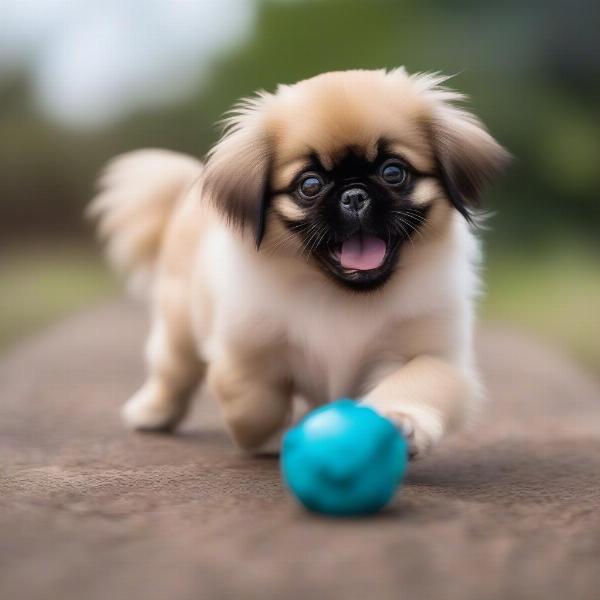The Toy Pekingese dog, often simply called a “Peke,” is a small but mighty breed with a rich history and a distinctive appearance. Known for their lion-like mane, flat face, and confident demeanor, these little dogs pack a lot of personality into a compact frame. If you’re considering welcoming a Toy Pekingese into your home, it’s important to understand their unique needs and characteristics. This comprehensive guide will delve into everything you need to know about this fascinating breed, from choosing a reputable breeder to providing the best possible care throughout their life.
History and Origins of the Toy Pekingese
The Pekingese originated in ancient China, where they were revered as sacred companions to the imperial family within the Forbidden City. For centuries, these little dogs were considered symbols of royalty and were treated with utmost respect. Their small size and luxurious coat made them ideal lap dogs, and their brave and independent spirit earned them the nickname “lion dogs.” It wasn’t until the late 19th century that Pekingese were introduced to the Western world, quickly becoming popular companion animals.
Temperament and Personality: What to Expect from a Peke
While small in stature, the Toy Pekingese possesses a bold and independent personality. They are known for their loyalty and affection towards their families but can be wary of strangers. Early socialization is crucial for ensuring they develop into well-adjusted adults. Despite their regal heritage, Pekes are also playful and enjoy engaging in games and activities.
 Toy Pekingese Playing
Toy Pekingese Playing
Finding a Reputable Breeder: Ensuring a Healthy Start
Choosing a responsible breeder is essential for ensuring the health and well-being of your Toy Pekingese. A good breeder will prioritize the health and temperament of their dogs, providing proper care and socialization for the puppies. They will also be knowledgeable about the breed and happy to answer any questions you may have. Be wary of breeders who offer puppies at unusually low prices or who don’t screen potential buyers.
Caring for Your Toy Pekingese: Health, Grooming, and Exercise
Toy Pekingese have specific needs when it comes to health, grooming, and exercise. Their brachycephalic (flat-faced) features can predispose them to certain breathing problems, and their long coat requires regular brushing to prevent matting. While they don’t need excessive exercise, daily walks and playtime are important for their physical and mental well-being.
Training Your Toy Pekingese: Patience and Positive Reinforcement
Training a Toy Pekingese can sometimes be challenging due to their independent nature. Positive reinforcement methods, such as rewarding good behavior with treats and praise, are most effective. Consistency and patience are key to success.
House Training a Toy Pekingese Puppy
House training a Toy Pekingese puppy can require extra patience. Establishing a consistent routine, rewarding successful potty breaks, and cleaning up accidents thoroughly can help speed up the process.
Socializing Your Toy Pekingese
Early socialization is crucial for Toy Pekingese puppies. Exposing them to a variety of people, places, and sounds from a young age will help them develop into confident and well-adjusted adults.
Feeding Your Toy Pekingese: Nutritional Needs and Considerations
Feeding your Toy Pekingese a high-quality diet formulated for small breeds is essential for their overall health. Avoid overfeeding, as they are prone to weight gain, which can exacerbate breathing problems.
Living with a Toy Pekingese: A Rewarding Experience
Living with a Toy Pekingese can be a truly rewarding experience. Their affectionate nature, playful spirit, and regal presence make them wonderful companions. While they require specific care, the love and loyalty they offer in return are priceless.
Conclusion: Is a Toy Pekingese Right for You?
The Toy Pekingese is a unique and fascinating breed with a long and storied history. They make loving and devoted companions for the right owners. If you’re prepared to meet their specific needs and appreciate their independent spirit, a Toy Pekingese could be the perfect addition to your family.
FAQ: Common Questions About Toy Pekingese Dogs
- Are Toy Pekingese good with children? While they can be affectionate with family members, Toy Pekingese are generally not recommended for households with very young children due to their delicate build.
- How much grooming do Toy Pekingese require? Their long coat requires regular brushing, at least a few times a week, to prevent matting and tangles.
- Are Toy Pekingese prone to any health problems? They can be prone to breathing problems due to their brachycephalic features and are also susceptible to certain eye conditions.
- How much exercise do Toy Pekingese need? They don’t require excessive exercise, but daily walks and playtime are important for their physical and mental well-being.
- Are Toy Pekingese easy to train? They can be independent and stubborn, so training requires patience and consistency.
- What is the average lifespan of a Toy Pekingese? They typically live for 12-15 years.
- Do Toy Pekingese bark a lot? They can be prone to barking, especially if they are not properly socialized.
ILM Dog is a leading international pet website dedicated to providing expert advice on dog care and breeding. We offer a wide range of resources for dog owners and enthusiasts, covering everything from breed selection and health care to training and nutrition. Our expert team is passionate about helping you provide the best possible care for your canine companion. Whether you’re a seasoned dog owner or a first-time puppy parent, ILM Dog is your go-to source for reliable and practical information. Contact us today at [email protected] or +44 20-3965-8624 to learn more about our services.